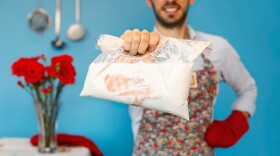
Ted Robbins
As supervising editor for Arts and Culture at NPR based at NPR West in Culver City, Ted Robbins plans coverage across NPR shows and online, focusing on TV at a time when there's never been so much content. He thinks "arts and culture" encompasses a lot of human creativity — from traditional museum offerings to popular culture, and out-of-the-way people and events.
Robbins also supervises obituaries or, as NPR prefers to call them, "appreciations," of people in the arts.
Robbins joined the Arts Desk in 2015, after a decade on air as a NPR National Desk correspondent based in Tucson, Arizona. From there, he covered the Southwest, including Arizona, New Mexico, and Nevada.
Robbins reported on a range of issues, from immigration and border security to water issues and wildfires. He covered the economy in the West with an emphasis on the housing market and Las Vegas development. He reported on the January 2011 shooting in Tucson that killed six and injured many, including Arizona Congresswoman Gabrielle Giffords.
Robbins' reporting has been honored with numerous accolades, including two Emmy Awards—one for his story on sex education in schools, and another for his series on women in the workforce. He received a CINE Golden Eagle for a 1995 documentary on Mexican agriculture called "Tomatoes for the North."
In 2006, Robbins wrote an article for the Nieman Reports at Harvard about journalism and immigration. He was chosen for a 2009 French-American Foundation Fellowship focused on comparing European and U.S. immigration issues.
Raised in Los Angeles, Robbins became an avid NPR listener while spending hours driving (or stopped in traffic) on congested freeways. He is delighted to now be covering stories for his favorite news source.
Prior to coming to NPR in 2004, Robbins spent five years as a regular contributor to The News Hour with Jim Lehrer, 15 years at the PBS affiliate in Tucson, and working as a field producer for CBS News. He worked for NBC affiliates in Tucson and Salt Lake City, where he also did some radio reporting and print reporting for USA Today.
Robbins earned his Bachelor of Arts in psychology and his master's degree in journalism, both from the University of California at Berkeley. He taught journalism at the University of Arizona for a decade.
-
Hollywood legend Garry Marshall died Tuesday at the age of 81. He was responsible for some of the biggest TV hits of the 1970s including The Odd Couple, Laverne & Shirley and Happy Days. He also made Julia Roberts a superstar with Pretty Woman.
-
"This police department trained in de-escalation far before cities across America did it," Mayor Mike Rawlings said on Friday after a deadly attack on the city's police officers.
-
Around the newsroom and around the world, here's what we're reading this week.
-
Béarnaise is a classic French sauce typically served with steak. But it's tricky for a home chef to keep the raw egg and the butter in it from separating. A chef reveals his secret weapon.
-
Also this week, an interview with John Lydon (you may know him as Johnny Rotten), race and Instagram filters, and the cost of living in Los Angeles.
-
Sous-vide makes meat moist and flavorful, but can take up to 96 hours, not to mention a $500 machine. Chef Christina Tosi shares a technique she uses to cheat in her home kitchen: the "Bird in a Bag."
-
A new report says thousands of people are being deported without their belongings, money or ID. And that's creating even more hardship for Mexican migrants when they return home.
-
Sympathy for former Rep. Gabrielle Giffords, who was shot in the head in 2011, helped get her successor elected. Now she lobbies for tighter gun laws, and a tough ad from her PAC has stirred anger.
-
Members of Lev Tahor left Canada with trail of allegations of child abuse. Then leaders of the Guatemalan village where they settled asked them to leave. The sect is again looking for a new home.
-
As the West moves more into a record-setting drought, many are taking a look at how water gets used. Alfalfa grown with Colorado River water is a case study of how and why water gets used as it does.







